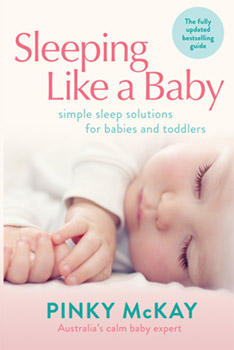Pinky's Top Tips To Help Your Baby Sleep

Pinky's Top Tips To Help Your Baby Sleep
Just like us, babies are individuals –and this goes for sleep requirements too. It may help (or not, if you are suffering from sleep deprivation) to realise that in most infant sleep studies, -all night' is defined as five hours. If you are thinking that even five hours uninterrupted sleep would be a dream come true, there are some gentle strategies you can try to help your baby, and you, to sleep better:
Know the signs – None of us like being kept awake when we are craving sleep, so rather than waiting until your baby is -past it', put her to bed as soon as she shows sleepy signs such as becoming quiet, yawning, making 'jerky" movements, losing interest in people and toys, and fussing. If you miss this window of opportunity, your baby is likely to become grumpy and find it difficult to settle
Introduce bedtime rituals – bedtime routines can become cues that help even tiny babies wind down and become conditioned to fall asleep. From the earliest days, give her a warm relaxation bath just before bedtime – this helps because one trigger for sleep is a slight drop in core body temperature, so after a bath you will have a -window' of drowsiness where you can feed and help baby to sleep more easily.
A magic touch – Silent nights could be at your fingertips: Research from Miami University showed that infants and toddlers who were massaged daily for one month, for 15 minutes prior to bedtime, fell asleep more easily by the end of the study. To learn how to massage your baby, check out Pinky's beautiful baby massage DVD .
Soothing sounds – The calming, repetitive sounds of traditional lullabies recall the -womb music' your baby heard before birth (your heartbeat, and fluids whooshing through the placenta). Baby music that incorporates elements such as the rhythm of the maternal heartbeat or -white noise' has remarkable soothing effects, especially if played continuously through the night on a low volume. Of course you can sing to your baby and having a special sleepy song or perhaps a traditional lullaby that may be part of your family's history (what did your mama sing to you?) will be a completely portable way to help your baby relax and feel secure.
Rock a bye baby – The motion of a rocking chair or being -worn' in a wrap or carrier as you walk will lull baby to sleep. So will gently bouncing on a fitball – hum or sing as you bounce.
All snuggled up – The startle reflex, a primitive survival reflex that produces spontaneous, jerky movements, even in sleep, can be disturbing (literally). Provide a sense of security by swaddling your newborn. Gradually unwrap and discard the wrap as this reflex disappears (at around three months) and baby starts to roll over.
Check your diet – your baby is never allergic to your milk but sometimes foods passing through your breastmilk can cause your baby to be wakeful or unsettled. For instance, caffeine can create a vicious circle: You drink coffee (or tea or cola) to give you a hit, baby gets a boost of stimulant through your milk- and becomes restless. Newborns are particularly vulnerable to caffeine: A newborn may take up to ninety seven hours to get rid of caffeine so if you drink several cups over the day, the effects will be accumulative.
Daytime feeds – Tiny tummies need frequent refills but soon your baby will start sleeping at least one longer stretch between feeds. If your newborn baby sleeps more than three hours between feeds during the day, it is reasonable to GENTLY unwrap him and offer a feed, then he might save his longer sleep for night -time. However, be patient if he is not ready to alter his pattern.
Try a -dream' feed – Whatever time your baby was last fed, gently offer a feed just before you go to bed yourself (hold him but don't wake him, he will suck in his sleep) and, with luck, his longer sleep may coincide with yours.
Do not disturb – Avoid waking baby during night feed times by changing the nappy either before or half way through a feed, not when baby is all drowsy and full. If baby is falling asleep during night feeds so only having a short feed, try changing the nappy half way through, then offering the other breast.
Let him suck up to the boss – Falling asleep on the breast is one of the easiest ways for most babies to settle. This is due to hormones released while your baby feeds but if you are concerned about it becoming a habit, alternate feeding with other sleep cues.
Share sleep – Research shows that mothers and babies who sleep together (within reach of each other, not necessarily in the same bed) share the same sleep cycles, so these mothers get more sleep overall.
Leave a little bit of mummy – it's not exactly a substitute for you, but if you slip your own soft, unwashed tee-shirt over baby's mattress (tucked in securely), she will be comforted by your familiar smell as she sleeps.
Stop the Clock – Simply knowing how long you are awake can be enough to make you too tense to get back to sleep, or it may encourage you to rush your baby and make him feel anxious. If you see your baby's waking as a genuine need, it could help you to enjoy this precious cuddle time: feel the softness of his skin, breathe in his delicious smell and snuggle!
If your baby is still awake " for more tips to help your baby (and you!) sleep, read Pinky McKay's best-selling book -Sleeping Like a Baby' . Download the first chapter free on Pinky's website www.pinkymckay.com
Have You Seen This?
MORE






